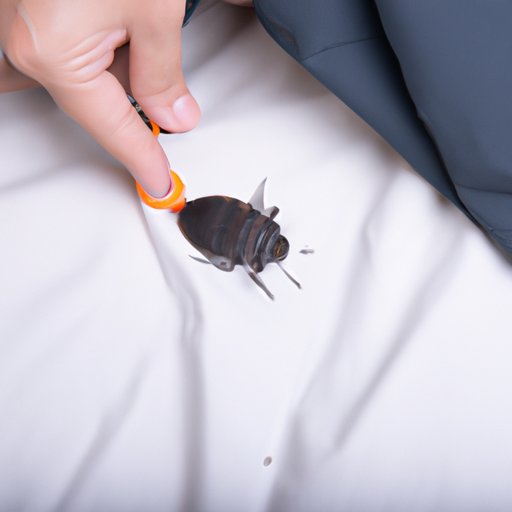Introduction
Bed bugs are tiny insects that are drawn to human blood, making them a serious problem for anyone who has them in their home. They can be difficult to get rid of, but with the right methods, it is possible to eliminate them safely and effectively. In this article, we will explore different practical and effective ways to exterminate bed bugs so you can enjoy a pest-free home.
Practical Cleaning Methods
The first step to getting rid of bed bugs is to thoroughly clean and vacuum your home. This includes not only your bed and bedding but also the upholstery, carpets, and other surfaces where bed bugs may hide. Begin by removing all clutter from your home, as this gives bed bugs fewer places to hide. Use a vacuum cleaner with a hose attachment to suck up any visible bed bugs, eggs, or droppings from surfaces and cracks in walls or furniture. Make sure you empty the vacuum into a sealed bag after each use, and dispose of it in an outside trash can.
Next, wash all of your bedding and clothes in hot water and dry them on high heat. The high temperatures will kill any remaining bed bugs or eggs. For personal items, such as stuffed animals or shoes, place them in a plastic bag and put them in the freezer for a few days. This will also kill any bed bugs or eggs.
Regular cleaning is critical in preventing bed bug infestations. Vacuum, dust and wipe down surfaces regularly to get rid of any bugs that may have hitched a ride into your home from any outside sources.
DIY Extermination Remedies
Several household items can be used to get rid of bed bugs. One popular option is vinegar, which has acetic acid that can kill bed bug eggs and nymphs. Mix equal parts of water and vinegar in a spray bottle, and spray the solution directly on bed bugs and their eggs. Allow the solution to dry and reapply it several times to get rid of all the bugs.
Baking soda is another effective bed bug killer. Mix it with water to create a paste, then spread it on the surfaces where bed bugs are found. Let the paste sit for a few hours before vacuuming it up. Similarly, essential oils such as tea tree oil and lavender oil can work well to repel and kill bed bugs. Dilute them with water and spray them in crevices and on surfaces where bed bugs are found.
The downside to these DIY remedies is that while they will work on a mild to moderate infestation, a larger bed bug problem will likely require stronger treatment methods.
Insecticides
For a more potent solution, there are numerous commercial insecticides available that are tested and recommended to kill bed bugs. Most come in the form of a spray or dust, which you can apply directly to areas where bed bugs reside. It is crucial to follow the instructions provided to ensure safety and effectiveness. Do note that some types of bed bugs have developed resistance to commonly used insecticides so be sure to use the latest professionally recommended recommended formulas.
Heat Treatment
One of the most effective ways to get rid of bed bugs is through heat treatment. This method involves exposing bed bugs to high temperatures, which they cannot tolerate and eventually die as a result. You can use your home dryers to do this by drying clothes, bedding, and other items at high heat. An alternative is to use standalone devices like heat chambers or steam cleaners. Do keep in mind the dangers of toasting the interior of any room with lethal heat by modern approaches.
The downside of heat treatment is that it can be more challenging to get rid of bed bugs hiding in hard-to-reach areas, such as deep inside a mattress. Another risk is the household accidents caused by improper usage of heating equipment.
Professional Extermination Services
If your bed bug problem persists despite your best DIY efforts, you may need to hire a professional exterminator. A pest control expert has access to professional-grade insecticides and can carry out heat treatment safely and effectively. They will examine your home to identify the extent of the bed bug infestation and recommend the most appropriate treatment method.
However, professional pest control services can be expensive and disruptive to your everyday living since your space would need to be evacuated.
Prevention Strategies
Preventing a bed bug infestation is much easier than dealing with one that has already taken hold. One of the most effective preventative measures is to regularly clean and vacuum your home, especially areas where bed bugs may be hiding. Bed bugs can enter your home through used furniture, so it is important to carefully check secondhand items before bringing them home. Consider using protective encasements for your mattress and box springs to keep bed bugs out.
Seal up any crevices or cracks in your walls, baseboards, or door frames where bed bugs might fit through. If you travel frequently, inspect your hotel room carefully, and store your luggage away from the bed, as bed bugs can hitch a ride home with you.
Conclusion
Bed bugs can be a persistent problem, but there are several methods to get rid of them once discovered. Start small with DIY remedies like baking soda and vinegar and work your way up to commercial insecticides or professional extermination services if necessary. Remember, the key to bed bug control is regular cleaning and prevention, so take steps to keep your home clean and free of bed bugs. With patience and persistence, you can successfully eliminate bed bugs and get back to enjoying a peaceful and pest-free home.
